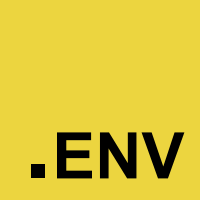Dotenv is a zero-dependency module that loads environment variables from a .env file into process.env. Storing configuration in the environment separate from code is based on The Twelve-Factor App methodology.
npm install dotenv --saveAs early as possible in your application, require and configure dotenv.
require('dotenv').config();Create a .env file in the root directory of your project. Add
environment-specific variables on new lines in the form of NAME=VALUE.
For example:
DB_HOST=localhost
DB_USER=root
DB_PASS=s1mpl3
That's it.
process.env now has the keys and values you defined in your .env file.
db.connect({
host: process.env.DB_HOST,
username: process.env.DB_USER,
password: process.env.DB_PASS
});If you are using iojs-v1.6.0 or later, you can use the --require (-r) command line option to preload dotenv. By doing this, you do not need to require and load dotenv in your application code.
$ node -r dotenv/config your_script.jsThe configuration options below are supported as command line arguments in the format dotenv_config_<option>=value
$ node -r dotenv/config your_script.js dotenv_config_path=/custom/path/to/your/env/varsAlias: load
config will read your .env file, parse the contents, and assign it to
process.env. You can additionally, pass options to
config.
Default: false
Dotenv outputs a warning to your console if missing a .env file. Suppress
this warning using silent.
require('dotenv').config({silent: true});Default: .env
You can specify a custom path if your file containing environment variables is named or located differently.
require('dotenv').config({path: '/custom/path/to/your/env/vars'});Default: utf8
You may specify the encoding of your file containing environment variables using this option.
require('dotenv').config({encoding: 'base64'});The engine which parses the contents of your file containing environment variables is available to use. It accepts a String or Buffer and will return an Object with the parsed keys and values.
var dotenv = require('dotenv');
var buf = new Buffer('BASIC=basic');
var config = dotenv.parse(buf); // will return an object
console.log(typeof config, config) // object { BASIC : 'basic' }The parsing engine currently supports the following rules:
BASIC=basicbecomes{BASIC: 'basic'}- empty lines are skipped
- lines beginning with
#are treated as comments - empty values become empty strings (
EMPTY=becomes{EMPTY: ''}) - single and double quoted values are escaped (
SINGLE_QUOTE='quoted'becomes{SINGLE_QUOTE: "quoted"}) - new lines are expanded if in double quotes (
MULTILINE="new\nline"becomes
{MULTILINE: 'new
line'}
- inner quotes are maintained (think JSON) (
JSON={"foo": "bar"}becomes{JSON:"{\"foo\": \"bar\"}")
No. We strongly recommend against committing your .env file to version
control. It should only include environment-specific values such as database
passwords or API keys. Your production database should have a different
password than your development database.
No. We strongly recommend against having a "main" .env file and an "environment" .env file like .env.test. Your config should vary between deploys, and you should not be sharing values between environments.
In a twelve-factor app, env vars are granular controls, each fully orthogonal to other env vars. They are never grouped together as “environments”, but instead are independently managed for each deploy. This is a model that scales up smoothly as the app naturally expands into more deploys over its lifetime.
We will never modify any environment variables that have already been set. In particular, if there is a variable in your .env file which collides with one that already exists in your environment, then that variable will be skipped. This behavior allows you to override all .env configurations with a machine-specific environment, although it is not recommended.
For [email protected]: Yes. dotenv.config() now returns an object representing
the parsed .env file. This gives you everything you need to continue
setting values on process.env. For example:
var dotenv = require('dotenv')
var variableExpansion = require('dotenv-expand')
const myEnv = dotenv.config()
variableExpansion(myEnv)For [email protected]: Use dotenv-expand.
For [email protected]: We haven't been presented with a compelling use case for expanding variables and believe it leads to env vars that are not "fully orthogonal" as The Twelve-Factor App outlines.[1][2] Please open an issue if you have a compelling use case.
See CONTRIBUTING.md
See CHANGELOG.md
See LICENSE
Here's just a few of many repositories using dotenv:
Here's some projects that expand on dotenv. Check them out.





